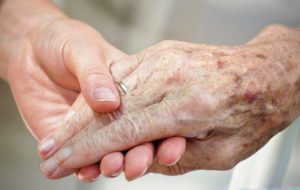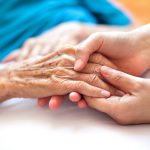Samaritan is a proud provider of Dementia Care and uniquely distinguished as a GUIDE provider by the Centers for Medicare and Medicaid (CMS). Click to learn more.
(856) 596-1600 available 24/7 Refer Now


As your loved one reaches the final stages of his or her illness, it’s understandable that you may have many questions and concerns.
The active phase of dying is the final stage of the natural process of bodily functions slowing down and/or ceasing. It’s important to understand what to expect and to learn the signs of active dying, but it’s also important to keep in mind that predicting when your loved one will pass away is still difficult. Just being present may be more valuable than any action you take.

Knowing what to expect when your loved one is actively dying, and what you can do, can make a difference in the care you provide and bring you peace of mind. Keep in mind that everyone is different and don’t always exhibit all the signs. Here are some signs that someone is actively dying.
Your loved one may not want food or drink and swallowing may become difficult. There may only be a need for enough liquid to keep the mouth from becoming dry. Offer, but do not force food, liquids, or medications.


If you are in the South New Jersey area and believe your loved one could benefit from hospice care, contact Samaritan 24 hours a day, 7 days a week for more information on how our services can help: (856) 596-1600. Remember, hospice is not a place, but instead a type of care. Our hospice team comes to you to provide help to your loved one and their family.
When you think your loved one passes away and you’re already receiving hospice care, call the hospice organization caring for him or her immediately. For patients and families receiving Samaritan’s hospice care at home, please call Samaritan at (856) 596-1600 and a nurse will be contacted immediately and will respond promptly.
When your loved one passes away at an inpatient facility such as The Samaritan Centers at Voorhees or Mount Holly, please notify a staff member.
Do not call the police, emergency squad, or 911, if a hospice organization is caring for you and your loved one.
As part of the hospice program, the nurse will help you with any calls to the physician and funeral home of your choice. Additionally, if you have more questions regarding “what is active dying” or any other related subjects, please don’t hesitate to contact Samaritan: (856) 596-1600.